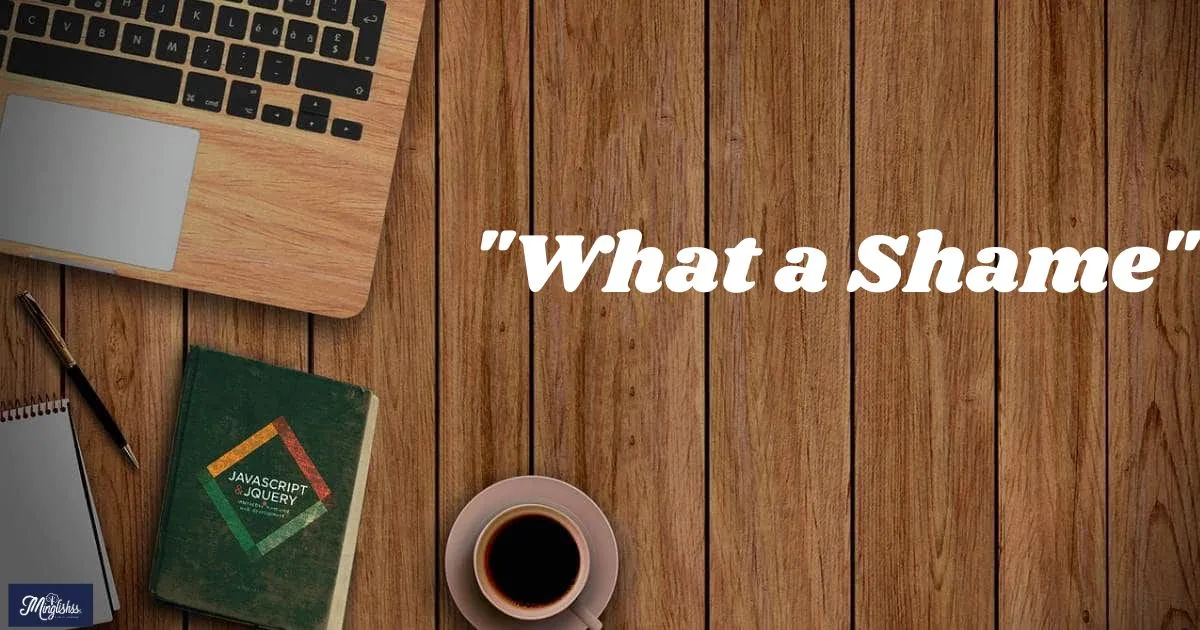“What a shame” is a common expression, but there are countless other ways to convey the same sentiment.
In everyday conversation, we often encounter moments that call for empathy or disappointment. The phrase “what a shame” serves as a convenient expression in such situations, but it can become repetitive. Exploring different ways to express similar feelings not only enriches our vocabulary but also enhances our communication skills. Whether you’re in a casual chat with friends or a formal discussion, knowing alternative phrases can make your expressions more engaging.
Let’s take a moment to encourage you to expand your language skills. Instead of sticking to the usual phrases, why not learn some fresh alternatives? Each expression you learn will give you the power to articulate your thoughts more precisely. By diversifying your language, you’ll be able to connect with others more effectively. Plus, it will make your conversations more enjoyable!
In this blog, we will delve into 35 alternative expressions for “what a shame.” Each phrase will come with a scenario, an explanation of its use, and additional tips. These insights will help you understand when and how to use each expression effectively. So, let’s get started on enhancing your linguistic toolbox!
1. How Disappointing

Scenario
Imagine your friend Jenna just found out that the concert she was looking forward to was canceled due to bad weather.
Subject Explanation
When we say “how disappointing,” it captures Jenna’s feelings perfectly. This phrase expresses empathy and validates her disappointment without sounding overly dramatic. It allows you to acknowledge her feelings genuinely.
Additional Tip
Using “how disappointing” can be appropriate in both casual and formal settings. It’s a simple phrase that conveys concern without being too heavy.
2. What a Bummer
Scenario
Tom had planned a picnic for the weekend, but it turned out to rain all day.
Subject Explanation
The phrase “what a bummer” is more informal and is often used among friends. It lightens the mood while still conveying disappointment. This makes it suitable for casual settings and helps keep conversations friendly.
Additional Tip
Use “what a bummer” to relate to friends about small disappointments. It works well in light-hearted situations and keeps the atmosphere relaxed.
3. That’s Too Bad
Scenario
Your colleague Linda learned that her favorite show was canceled after one season.
Subject Explanation
Saying “that’s too bad” offers a sympathetic response that acknowledges someone’s feelings. It’s neutral and doesn’t overemphasize the situation, making it suitable for various contexts, from work to casual chats.
Additional Tip
This phrase is great for professional settings when you want to express understanding without getting overly emotional. It keeps the conversation respectful and composed.
4. Such a Pity
Scenario
Mark received a job offer but had to decline because it clashed with his studies.

Subject Explanation
Using “such a pity” shows that you recognize the unfortunate circumstances. This expression conveys a touch of sadness without sounding too dramatic, making it ideal for personal conversations.
Additional Tip
“Such a pity” is perfect for expressing regret. You can use it in conversations about missed opportunities, keeping the tone gentle and considerate.
5. How Sad
Scenario
Emily just found out that her favorite author passed away.
Subject Explanation
Saying “how sad” is straightforward and direct. It communicates your sympathy clearly and shows that you care about the person’s feelings, making it ideal for sensitive situations.
Additional Tip
Use “how sad” when you want to express deep empathy. It’s best suited for situations involving loss or significant disappointments.
6. What a Disappointment
Scenario
Chris realized he couldn’t attend his best friend’s wedding due to a scheduling conflict.
Subject Explanation
This phrase is straightforward and emphasizes the disappointment felt in the situation. It’s particularly effective in more formal conversations, as it maintains a respectful tone.
Additional Tip
This phrase works well in both personal and professional contexts. It clearly conveys your feelings without being overly emotional.
7. What a Letdown
Scenario
Samantha’s favorite team lost the championship game after a promising season.

Subject Explanation
Using “what a letdown” captures the essence of disappointment in a relatable way. This expression adds a layer of understanding that resonates well among sports fans.
Additional Tip
This phrase is great for discussing shared experiences, especially in casual settings. It creates a bond over mutual disappointments.
8. How Unfortunate
Scenario
David discovered that his flight was delayed for several hours.
Subject Explanation
Saying “how unfortunate” is a more formal way to express disappointment. It’s polite and acknowledges the other person’s feelings while maintaining a respectful distance.
Additional Tip
This phrase is suitable for professional conversations, especially when discussing logistical issues. It keeps the tone serious yet empathetic.
9. What a Tragedy
Scenario
A community project was canceled due to lack of funding.
Subject Explanation
The phrase “what a tragedy” conveys a stronger emotional response. It’s effective for serious situations that have significant implications, making it a powerful way to express concern.
Additional Tip
Use this expression sparingly, as it carries heavy connotations. It’s best suited for situations with far-reaching effects.
10. That’s a Shame
Scenario
Rachel found out that her favorite café closed down.
Subject Explanation
“This is a shame” is a straightforward expression that communicates disappointment without extra emotion. It’s versatile and can fit in many conversations.
Additional Tip
This phrase is great for everyday conversations. It’s simple yet effective in expressing empathy.
11. What a Missed Opportunity

Scenario
Aaron had a chance to apply for a scholarship but missed the deadline.
Subject Explanation
Using “what a missed opportunity” emphasizes the regret of not seizing a chance. It provides a more detailed acknowledgment of what was lost.
Additional Tip
This phrase works well in discussions about career and education. It conveys a sense of understanding and encourages reflection.
12. That’s Disheartening
Scenario
Lisa was excited about a project, but it got rejected.
Subject Explanation
Saying “that’s disheartening” highlights the emotional impact of the situation. It shows empathy while acknowledging the struggle the person feels.
Additional Tip
Use this phrase when discussing creative or personal projects. It conveys a deeper understanding of emotional investments.
13. What a Hard Break
Scenario
John’s promotion was given to someone else after he worked hard for it.
Subject Explanation
“This is a hard break” emphasizes the difficulty of the situation while remaining relatable. It recognizes the effort put in and the disappointment felt.
Additional Tip
This phrase is suitable for discussing career setbacks. It validates feelings and fosters understanding among colleagues.
14. That’s a Real Downer
Scenario
Sarah was planning a vacation but had to cancel due to personal issues.
Subject Explanation
“This is a real downer” adds a lighthearted touch to expressing disappointment. It can soften the blow of bad news while still being empathetic.
Additional Tip
Use this phrase in friendly conversations to maintain a relaxed atmosphere. It works well for discussing personal issues among friends.
15. What a Disheartening Situation
Scenario
The local community center closed due to budget cuts.
Subject Explanation
“This is a disheartening situation” conveys the seriousness of the issue while still expressing sadness. It’s suitable for discussions about community matters.
Additional Tip
This expression is perfect for addressing broader societal issues. It shows concern and encourages dialogue about possible solutions.
16. What a Setback
Scenario
Ben’s start-up faced unexpected challenges, delaying its launch.
Subject Explanation
Saying “what a setback” highlights the challenges faced and the impact on progress. It acknowledges the difficulty without being overly dramatic.
Additional Tip
Use this phrase when discussing professional challenges. It encourages resilience and provides an opportunity for problem-solving.
17. What a Sad Turn of Events
Scenario
Jessica learned that her favorite band canceled their tour.
Subject Explanation
“This is a sad turn of events” conveys the disappointment while recognizing the shift in circumstances. It shows empathy toward those affected.
Additional Tip
This phrase works well for discussing unexpected changes. It creates a space for sharing feelings and reactions.
18. How Frustrating
Scenario
Alex faced multiple delays while trying to complete his project.
Subject Explanation
Using “how frustrating” directly addresses the emotions involved. It’s a relatable way to express annoyance and disappointment simultaneously.
Additional Tip
This phrase is suitable for both personal and professional settings. It fosters camaraderie among those experiencing similar frustrations.
19. What a Heartbreaker
Scenario
Megan was excited about a potential job offer that fell through.
Subject Explanation
Saying “what a heartbreaker” adds emotional weight to the disappointment. It connects deeply with the person’s feelings and shows empathy.
Additional Tip
Use this phrase in personal conversations where feelings are deeply affected. It creates a bond of understanding between friends.
20. That’s Quite Unfortunate
Scenario
Nick missed his flight due to traffic.
Subject Explanation
“This is quite unfortunate” maintains a formal tone while expressing disappointment. It’s suitable for professional interactions.
Additional Tip
This phrase works well when addressing issues in business settings. It keeps the conversation respectful while acknowledging the inconvenience.
Other Ways to Say “This Is Because”
21. What a Tough Break
Scenario
Angela had a great idea but got overshadowed in a meeting.
Subject Explanation
Using “what a tough break” highlights the difficulty faced while remaining relatable. It shows understanding of the challenges others encounter.
Additional Tip
This phrase is good for discussing personal challenges. It promotes a supportive atmosphere among peers.
22. How Unlucky
Scenario
Kevin forgot to apply for a grant, and the deadline passed.
Subject Explanation
Saying “how unlucky” acknowledges the role of chance in disappointment. It adds a layer of understanding to the situation.
Additional Tip
Use this phrase when discussing situations influenced by luck. It creates a sense of shared experience with others.
23. That’s a Real Shame
Scenario
Patricia was unable to attend a family reunion due to scheduling conflicts.
Subject Explanation
“This is a real shame” conveys genuine disappointment. It shows understanding of the emotional impact of missed opportunities.
Additional Tip
This phrase works well in various contexts. It maintains empathy while keeping the tone light.
24. What a Hard Pill to Swallow
Scenario
Tim’s promotion was announced, but he didn’t get it despite his hard work.
Subject Explanation
Using “what a hard pill to swallow” illustrates the difficulty of accepting disappointment. It emphasizes the emotional struggle involved.
Additional Tip
This phrase can be effective in personal and professional conversations. It fosters empathy and encourages open dialogue about feelings.
25. What a Missed Chance
Scenario
Laura had a chance to join an elite club but didn’t meet the criteria.
Subject Explanation
Saying “what a missed chance” highlights regret about lost opportunities. It shows understanding of the person’s feelings while keeping the focus on the situation.
Additional Tip
This phrase is useful for discussing opportunities in personal and professional contexts. It encourages reflection and growth.
26. What a Sorrowful Situation
Scenario
The local shelter had to close its doors due to funding issues.
Subject Explanation
“This is a sorrowful situation” expresses concern for those affected. It captures the emotional weight of serious issues.
Additional Tip
Use this phrase for discussions about community matters. It emphasizes the importance of the situation and encourages dialogue on solutions.
27. What a Devastating Blow
Scenario
A beloved local restaurant announced its permanent closure.
Subject Explanation
Using “what a devastating blow” conveys strong feelings of loss. It emphasizes the emotional impact of the situation on the community.
Additional Tip
This phrase should be reserved for serious discussions. It creates a space for reflection and empathy.
28. That’s Quite a Letdown
Scenario
Hannah’s long-awaited vacation was canceled due to unforeseen circumstances.
Subject Explanation
Saying “that’s quite a letdown” balances empathy with a casual tone. It shows understanding without being overly dramatic.
Additional Tip
This expression is suitable for everyday conversations. It allows for shared feelings while keeping the mood light.
29. What a Challenge
Scenario
Jake faced numerous obstacles in getting his project approved.
Subject Explanation
Using “what a challenge” focuses on the difficulties encountered. It acknowledges the struggle while maintaining a positive outlook.
Additional Tip
This phrase is effective in professional settings. It encourages resilience and teamwork in overcoming challenges.
30. That’s Quite Disappointing
Scenario
Mia learned that her favorite event was canceled at the last minute.
Subject Explanation
“This is quite disappointing” expresses empathy while remaining formal. It’s a versatile phrase suitable for various conversations.
Additional Tip
Use this phrase in professional discussions to maintain respect while acknowledging the situation.
31. What a Heart-Wrenching Moment
Scenario
The news reported on a natural disaster that affected many families.
Subject Explanation
Saying “what a heart-wrenching moment” conveys deep empathy and sadness. It emphasizes the emotional impact of significant events.
Additional Tip
Use this phrase in serious discussions involving loss or tragedy. It shows respect and understanding of the gravity of the situation.
32. That’s Such a Disappointment
Scenario
Your friend missed an important milestone because of unforeseen circumstances.
Subject Explanation
“This is such a disappointment” directly expresses empathy while being informal. It maintains a friendly tone and encourages connection.
Additional Tip
This phrase is excellent for casual conversations. It helps friends relate to each other’s feelings.
33. What a Displeasure
Scenario
You found out that a much-anticipated movie was poorly reviewed.
Subject Explanation
Using “what a displeasure” conveys disappointment in a formal manner. It highlights the negative feelings associated with unmet expectations.
Additional Tip
This phrase can be effective in professional settings. It keeps conversations polite while addressing feelings.
34. How Unfortunate
Scenario
A local festival had to be postponed due to unforeseen circumstances.
Subject Explanation
Saying “how unfortunate” captures the disappointment of a situation without too much emotion. It’s neutral and appropriate for various contexts.
Additional Tip
This expression is suitable for professional and personal conversations. It maintains a respectful tone while acknowledging disappointment.
35. What a Letdown
Scenario
A new restaurant opened, but it didn’t live up to the hype.
Subject Explanation
Using “what a letdown” expresses frustration and disappointment in a relatable way. It’s ideal for informal settings.
Additional Tip
This phrase is great for casual conversations with friends. It keeps the mood light while acknowledging disappointment.
Pros and Cons of Using Alternative Phrases
Pros
- Variety: Using different phrases can make conversations more engaging.
- Precision: Some phrases convey specific emotions better than “what a shame.”
- Connection: Alternatives can foster deeper understanding and empathy.
Cons
- Overuse: Using too many alternatives may confuse your audience.
- Context: Not every phrase fits every situation; it requires careful consideration.
- Subtlety: Some expressions may sound insincere if used incorrectly.
Conclusion
Exploring other ways to say “what a shame” allows you to express your feelings with more nuance. Each alternative phrase has its own emotional weight and can be used in various contexts. By understanding these expressions and their appropriate usage, you can enhance your communication skills and connect with others more effectively.
So, the next time you find yourself saying “what a shame,” consider using one of these alternatives instead. It will enrich your conversations and help you express empathy more meaningfully!
Answer to key questions
1. What does “what a shame” mean?
Answer: “What a shame” is an expression used to convey disappointment or sympathy regarding a situation. It often reflects a sense of regret about something unfortunate that has happened.
2. Why should I use alternative phrases for “what a shame”?
Answer: Using alternative phrases adds variety to your language and helps convey specific emotions more precisely. It can make your communication more engaging and relatable.
3. Can I use these phrases in professional settings?
Answer: Yes, many of these alternative phrases are suitable for professional settings. However, it’s important to choose the right phrase that matches the tone of the conversation and the gravity of the situation.
4. How do I know which phrase to use?
Answer: Consider the context and the emotional weight of the situation. Some phrases are more casual, while others are more formal. Think about your relationship with the person you’re speaking to and the message you want to convey.
5. Are there situations where it’s better to stick with “what a shame”?
Answer: Yes, in casual conversations or when the situation is not overly serious, “what a shame” can be a perfectly acceptable choice. It’s simple and universally understood.

Hi, I’m Isabel: I’m passionate about turning language learning into a fun adventure. I believe in making every word exciting and memorable.










